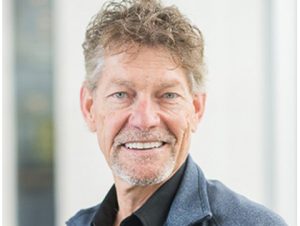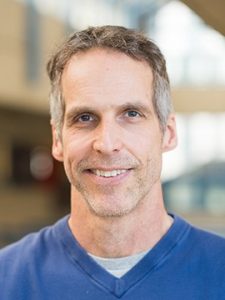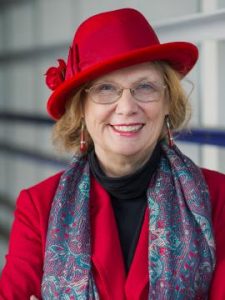Meet Dr. Stephanie Spacciante: Soaking up Culture
Stephanie Spacciante says she launched the Summer Study Abroad program in the Department of French, Hispanic and Italian Studies with one thing in mind: that you can only do so much in the classroom. “You can learn a language,” explains Spacciante, a lecturer in the Department of French, Hispanic, and Italian Studies and founder of of the Summer Study Abroad program, “but you can’t learn the culture unless you’ve lived there.”
Meet Dr. Dietmar Neufeld: Exploring Religion
Professor Dietmar Neufeld believes that an effective teacher is someone who can perform the story. “In the beginning was the word, and the word was performance.” So goes one of Professor Dietmar Neufeld’s mantras, which is also a tool he uses for unearthing the origins of Christianity.
Meet Neil Guppy: Using Sociology to support students
Sociology Department Head and Professor, Neil Guppy, believes in the power of student initiatives, especially Student Directed Seminars.
Guppy has been the Sociology Department Head for 4 years, in which he has worked to ensure the best possible experience for UBC students and faculty.
“My most important duties are hiring new faculty in conjunction with my colleagues, trying to provide a supportive environment for learning and research, and trying to represent the interests of sociology students and faculty, and the university more broadly,” he described. In addition, Guppy teaches several sections of Sociology 100, a popular first-year survey course.
During his UBC career, Guppy has had a hand in some of UBC’s most popular outlets for student engagement; including working with UBC’s unique first-year orientation, Imagine UBC, and helping to create the Student Directed Seminars (SDS) program.
Guppy coordinated the inaugural SDS program with former AMS president, Vivian Hoffmann. Hoffmann was interested in creating opportunities for students to lead learning. She based her proposal upon a program she witnessed while studying at the University of California, Berkley. Hoffmann brought her idea to Guppy, looking for support and guidance.
“She came to see me because I was the Associate Dean, and most responsible for student issues,” Guppy remembered. “She and I constructed and implemented what is now the SDS seminar.”
The SDS program is an extension of UBC’s Directed Studies program, which allows students to work one-on-one with a professor doing research in a narrow field. SDS courses are designed and directed by students with the assistance of a volunteer faculty member. The SDS Advisory Committee reviews and approves final course outlines before they are offered for registration. Guppy has served as chair on the SDS Advisory Committee for the past six years.
Proposed classes must be on a topic that is not offered at UBC, and have a minimum registration requirement of eight. Students in third year and above are encouraged to submit applications by the deadline. Past courses have included: Think Globally, Act Locally: Citizenship in Vancouver; Chick Lit: Making (Over) a Context; Lifting the Veil: Representations of Middle-Eastern Women; and Graphic Novels: Legitimizing the Genre. SDS courses can span across all faculties and departments.
“We did it as an alternative way for students to engage with topics that weren’t in the UBC curriculum.” Guppy said, explaining that students flourish when they are given the chance to pursue topics they are passionate about. “I believe it’s been tremendously successful. Students are very engaged with learning in the program.”
“My favourite example is the concluding workshop that students had in a hotel in the Downtown Eastside, where they had been exploring alternative ways of representing social change. It was just a very moving, very involved, very passionate three hours of presentation and debate and dialogue with 40 or 50 members of the Downtown Eastside community.”
“Like Imagine UBC, which I was also very involved with when it started, it happened because a student at the University had a really good idea and we were able to jointly implement it,” he said.
“Many of our students have had many good ideas and have been able to push and work them in ways that are beneficial to generations after them.”
By Meghan Roberts (BA 2008, English Literature and International Relations).
Meet Todd Handy: Integrating learning outside the classroom
Todd Handy is no stranger to working with students, both in and out of the classroom.
A UBC Psychology Professor, Handy interacts with students on daily basis. Director of the UBC Neuroimaging Lab and formally affiliated with the cognitive neuroscience lab, Handy likes working with undergraduate students in research positions because of the unique perspective they bring. He cites their “creative input” and inquisitive nature as assets to his lab environment. In addition, Handy enjoys seeing students become excited by the research they conduct; he remarks that “It’s reinforcing when you see students […] get charged up by issues and questions we’re pursuing.”
“I’ve really enjoyed being able to meet and understand and get to know students in ways you couldn’t in the classroom,” Handy said. “As a teacher I think it’s invaluable and helps understand the mindset of students and what they like and don’t like in classes.”
Heavily involved with students as a faculty mentor and co-chair of the former Faculty of Arts Academic Commuter Transition program, Handy took his teaching to the next level. FAACT was a UBC Peer Program that catered towards the distinct transition needs of first-year commuter students, and gives them a positive beginning to their UBC experience. He was open to collaborating with students, and when he first started, his hope was to meet with students and find out programs and activities that “might be interesting for them”. Key components of FAACT have now been integrated into ASTU 150.
According to Handy, working with students “helps me understand ways I can improve my teaching.” With a faculty member so involved in student life, it’s no wonder that his department won the 2009/2010 Alfred Scow Student Development Award.
By Meghan Roberts (BA 2008, English Literature and International Relations) and updated by Katie Fedosenko (BA 2011, English Literature)
[Photo Courtesy of CASS]
Meet Dr. Arlene Sindelar: Her Path to History
As an undergraduate at Concordia University Chicago, Dr. Arlene Sindelar studied math. She even taught math as a student teacher before graduating. But it was while student teaching that she made an interesting observation—she enjoyed studying math, she liked teaching math, but she didn’t really think much about math once she left the classroom. Instead, she thought about history. History had always captured her imagination and it was history that drew her back.




